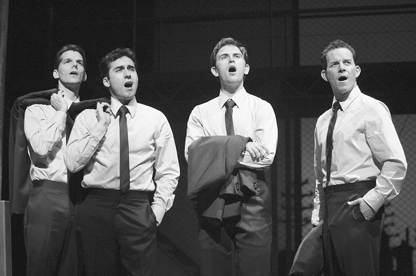“Jersey Boys” proves jukebox musicals can be good theater
“Jukebox Musical” has become a term that is generally used derisively by the theatrical cognoscenti. And, to be blunt, derision is barely sufficient for such horrors as “Good Vibrations” and “Lennon.”
It seems, however, that it was just bad theater, not an unworkable format. With “Jersey Boys,” writers Marshall Brickman and Rick Elice, composer Bob Gaudio and lyricist Bob Crewe have demonstrated that there might be decent shows to be developed from pre-existing material. Not just decent, in fact—downright entertaining. No one is going to pretend that “Jersey Boys” breaks any new ground in the musical theater. Nor does it aspire to be more than a high-voltage, populist entertainment, but it’s packing them into the August Wilson Theater, and giving people a wonderful time. With how bleak much of this season has been so far, I’ll take it.
Though the music of Frankie Valli has never been anything more than peripheral to my life, I found myself engaged in the story, delighted by the stagecraft and totally involved in the experience. In fact, aside from the fact that the music wasn’t written for the stage, this is a legitimate musical that easily stands along the side of the lighter but enduring and classic American musicals. It reminds us that perhaps it’s time to expand the mythic “American Songbook” to include not just Gershwin, Berlin and Porter but musical innovators like Gaudio and Crewe as well. Perhaps their innovation doesn’t appear to be so riveting, coming as it does in the context of popular music forms, but it’s there all the same.
There is something thrilling when we first hear the horns in “Can’t Take My Eyes Off of You,” for example. I don’t care how many times that song has bombarded you in cocktail lounges or elevators or, depending on your age, from top-40 radio; when you get the story behind how those horns were introduced into a form that never had horns, and then it happens in front of you and seems new, that’s good theater.
A lot of the credit for the show’s success goes to Brickman and Elice. Where most Jukebox Musicals have fallen apart is that the books are flimsy, implausible, and devoid of humanity. The writers have crafted distinct characters, and though they use the telescoping techniques of musical plotting, Frankie Valli and his cohorts become real—people one could care about, and that, to me, is what makes theater. Unlike “Mamma Mia,” which despite its financial and popular success still feels gimmicky and forced, the fluidity of “Jersey Boys” and the seamless transition from exposition to song to character scene to song feels like real theater.
The story is not much more sophisticated than your average “Behind the Music” tale, yet it’s told with enough heart and depth that it becomes consistently engaging. The second act may feel a little rushed to get in all the plot points, but that’s a common failing of musicals. There is the obligatory “everyone get up and dance” finale/curtain call that is a fixture of almost every musical except “The Light in the Piazza” and “Sweeney Todd” these days, but even that feels organic to the show. And, I have to say there were more than a few people at the performance I saw for whom Frankie Valli and the Four Seasons were an important part of their pasts and who were clearly moved by the whole show.
I was not moved, but I was impressed, and mightily entertained. The entire cast is tremendous. John Lloyd Young as Frankie Valli is dead-on with the falstetto, even allowing it to mature and get darker as he gets older. His technique is flawless, and while singers in these shows often scream the numbers, Young’s placement, tonality and diction are perfect. Daniel Reichard is terrific as Bob Gaudio. His trip from confident boy to savvy musical entrepreneur is well done, and Reichard is a charming stage presence. Christian Hoff as Tommy DeVito is a wonderful mix of street smarts, braggadocio, and vulnerability. J. Robert Spencer as Nick Massi is amazing both as a singer and an actor, in the smaller but pivotal role. Spencer is clearly having the time of his life, and it shows. Each of the men has his wonderful moments downstage center, as the narrative shifts from each of their perspectives over time. It’s a nice way to tell the story, and the conceit never wears thin.
The serviceable and surprising set by Klara Zieglerova is punctuated by Roy Lichtenstein-esque projections that provide wry commentary on the action. The costumes by Jess Goldstein are dead on as we follow the characters decade by decade, and Howell Binkley’s lighting is equally smart and appropriate. Special mention should be made of sound designer Steve Canyon Kennedy who has filled the theater with perfect sound, never overwhelming the action and balancing speaking and singing throughout while always being integrated in the entire experience.
Director Des McAnuff keeps the action moving, and makes the entire evening a wonderful spectacle and a real breakthrough for this type of show. I expect it will rival Frankie Valli’s career for longevity.
gaycitynews.com

































